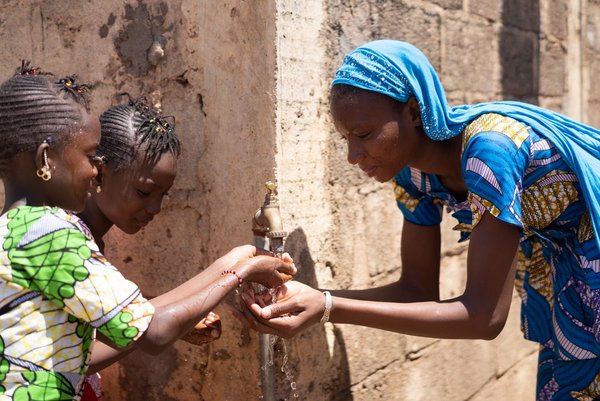 Read this article in French
Read this article in French- Share this article
- Subscribe to our newsletter
Joint effort towards a water-secure world
With mounting pressures on water from rising consumption demands, increased pollution and climate change, world leaders, civil society, businesses, youth and other stakeholders came together at the UN 2023 Water Conference from the 22nd to the 24th March at the UN Headquarters in New York to make commitments to address the global water crisis and set the world back on track to achieving Sustainable Development Goal 6 – On Clean Water and Sanitation.
“This is more than a conference on water. It is a conference on today’s world seen from the perspective of its most important resource,” said United Nations Secretary-General António Guterres in his opening remarks.
Access to safe water, sanitation and hygiene is the most basic human need for health and well-being, and a declared human right. But some two billion people around the world still lack access to safe drinking water. More people have access to mobile phones than to toilets and sanitation, with 80 per cent of wastewater discharged untreated into the environment. More than 90 per cent of disasters are water-related, with climate change adding to the pressure. And humanity’s demand for water keeps growing, with pressure on freshwater projected to increase by more than 40 per cent by 2050.
Water Action Agenda
The key outcome of the UN 2023 Water Conference is the Water Action Agenda, a collection of commitments from Member States and other stakeholders which seeks to present game-changing solutions to accelerate progress on SDG 6. More than 700 commitments aimed at driving transformation from a global water crisis to a water-secure world have been registered from governments, UN agencies, business leaders and civil society. They range from targeting open data sources and improving education around water to scaling effective water management practices and mobilising funds to drive action towards water.
The agenda represents the global community’s bold resolve to address the water challenges through a more coordinated and results-driven approach. A number of other follow-up steps are under consideration, too – including the appointment of a Special Envoy on Water. The conference outcomes will also receive concrete follow-up in three key upcoming Summits: the SDG Summit during the UN General Assembly in September 2023, the Summit of the Future in 2024 and the World Social Summit in 2025, and through the annual High-level Political Forum on Sustainable Development (HLPF), the Conference of Parties and other United Nations processes, as well as the Dushanbe Water Process.
Open Call for Water Action
At the conference, over 50 of the world’s largest corporations, operating in over 130 countries and employing two million people world-wide, launched the Business Leaders’ Open Call for Accelerating Water Action. The Open Call for Water Action is an appeal for private sector action to help solve the global water crisis and advance progress on SDG 6 to ensure access to water and sanitation for all. The Open Call provides a unified commitment by the corporate sector to the Water Action Agenda, the main outcome of the UN Water Conference.
By joining the Open Call for Water Action, companies commit to work to build water resilience across their own global operations and supply chains. They also pledge to work collaboratively across sectors to achieve collective positive water impact in at least 100 prioritised water-stressed basins by 2030. The strategy aims to contribute to water security for three billion people, and help enable safe drinking water and sanitation for more than 300 million people.
(UN/ile)
Visit the UN Water Conference website





Add a comment
Comments :